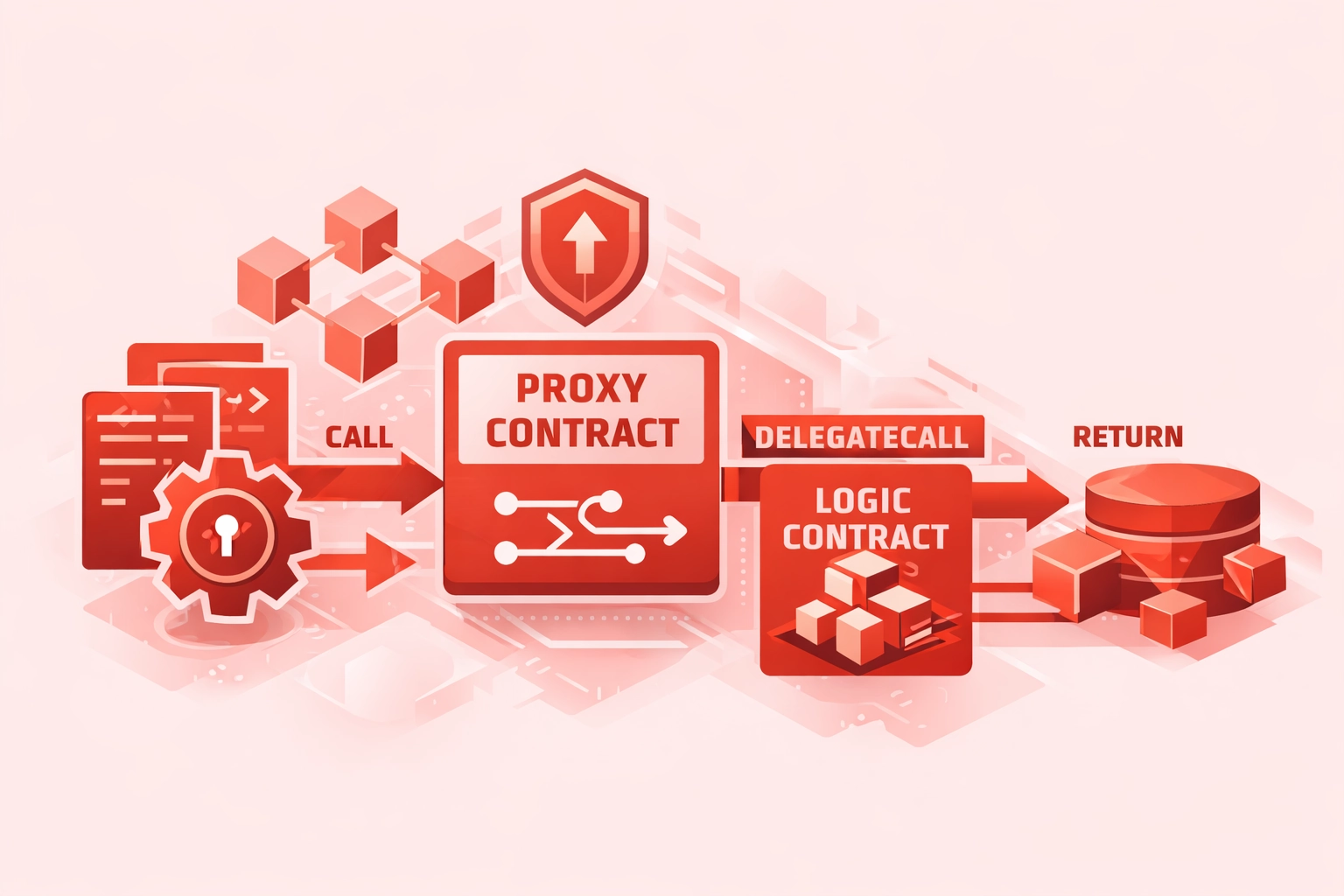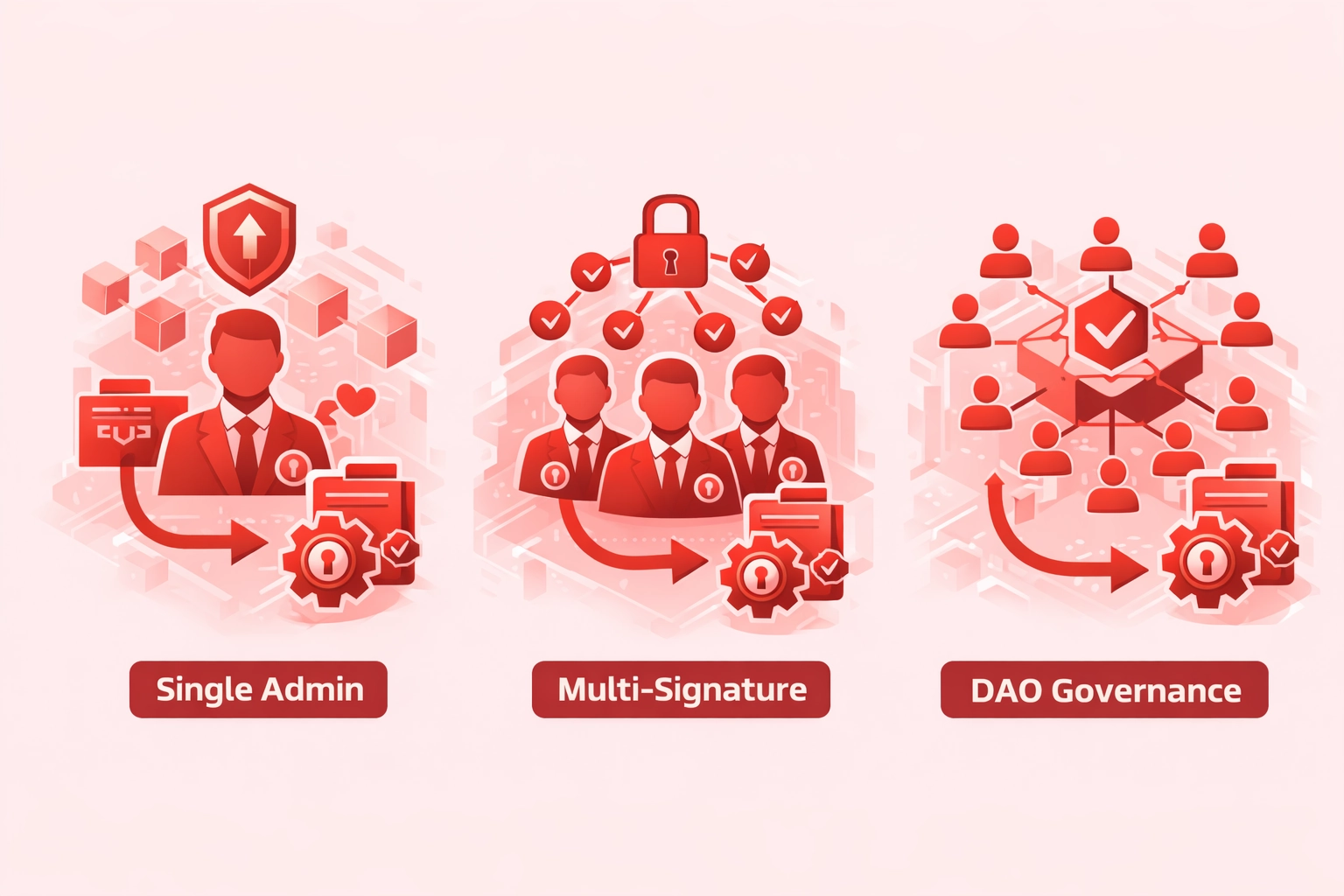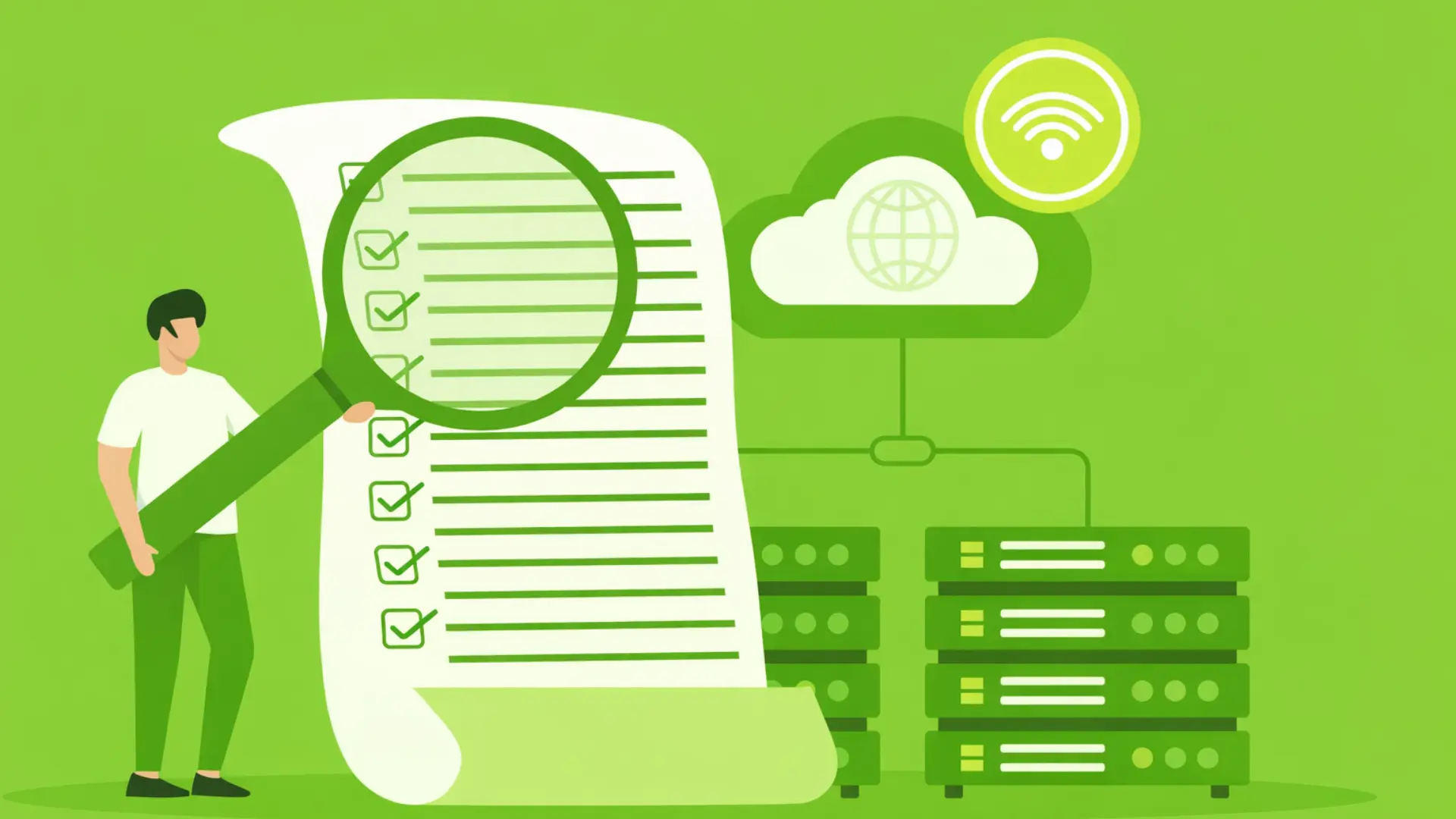Key Takeaways
- Proxy Contracts in Smart Contracts upgradeability by separating storage and logic, allowing implementation changes without altering user-facing addresses.
- Delegatecall is the core mechanism enabling proxy patterns, executing implementation code within the proxy’s storage context for seamless state management.
- Transparent Proxy, UUPS, and Beacon patterns offer different tradeoffs between gas efficiency, security, and scalability for various use cases.
- Storage layout management is critical in proxy contracts to prevent data corruption during upgrades across USA, UK, UAE, and Canada deployments.
- Initializer functions replace constructors in upgradeable contracts, requiring careful implementation to prevent re-initialization vulnerabilities and exploits.
- Admin access control in proxy contracts must implement timelocks and multi-signature requirements to prevent unauthorized or malicious upgrades.
- Security vulnerabilities including storage collision, uninitialized proxies, and selector clashing require professional auditing before mainnet deployment.
- Gas costs vary significantly between proxy patterns, with UUPS offering lower deployment costs but requiring upgrade logic in implementation contracts.
- OpenZeppelin provides battle-tested proxy implementations that enterprises worldwide trust for building secure upgradeable smart contract systems.
- Proxy contracts are essential for long-term blockchain projects requiring regulatory compliance updates, bug fixes, and feature enhancements post-deployment.
What Are Proxy Contracts in Smart Contract Architecture
Proxy contracts represent a fundamental architectural pattern in smart contract design that enables upgradeability while preserving the immutable nature of blockchain technology. A proxy contract acts as an intermediary layer between users and the actual business logic, forwarding all function calls to a separate implementation contract while maintaining its own persistent storage. This separation allows teams to update contract logic without changing the address users interact with or losing accumulated state data.
Our agency has implemented proxy contracts for enterprises across the USA, UK, UAE, and Canada over the past eight years. We have witnessed how this pattern transforms blockchain applications from static deployments into living systems capable of evolving with changing requirements. Major DeFi protocols managing billions in assets rely on proxy contracts to deliver security patches, implement governance decisions, and add features demanded by their communities.
Understanding proxy contracts is essential for anyone building production-grade blockchain applications. These patterns balance the security benefits of immutability with the practical need for ongoing maintenance and improvement that enterprise software requires.
The Challenge of Immutability in Blockchain Applications
Blockchain’s core value proposition includes immutability, meaning once data or code is deployed, it cannot be changed. This property provides security guarantees that traditional systems cannot match. However, immutability creates significant challenges for software that must adapt to changing conditions. Traditional software benefits from continuous deployment pipelines that push updates seamlessly, but smart contracts lack this flexibility by design.
The tension between immutability and upgradeability has driven innovation in proxy contract patterns. These solutions preserve the benefits of blockchain’s trustless execution while enabling controlled modifications to application logic. The key insight is separating what must remain immutable (storage and address) from what can safely change (implementation logic).
Projects that ignore upgradeability often face catastrophic failures when bugs are discovered. The DAO hack in 2016 demonstrated the consequences of deploying immutable code with vulnerabilities. Modern proxy patterns provide escape hatches while maintaining appropriate security controls.
Logic and Storage Separation in Proxy Contract Design
The fundamental principle behind proxy contracts is the clean separation between storage and logic. The proxy contract maintains all persistent state data including user balances, configuration parameters, and accumulated history. The implementation contract contains only the business logic that operates on this data. This separation enables replacing logic while preserving state.
When users call functions on the proxy, it forwards these calls to the current implementation using delegatecall. This EVM opcode executes the implementation’s code within the proxy’s storage context. The implementation reads and writes to the proxy’s storage slots as if they were its own, enabling seamless state management across upgrades.
This architecture requires careful storage layout management. Both proxy and implementation must agree on which storage slots contain which data. Misalignment causes data corruption that can be catastrophic for financial applications.
Understanding Delegatecall in Proxy-Based Architecture
Delegatecall is the EVM instruction that makes proxy contracts possible. Unlike regular calls that execute code in the target contract’s context, delegatecall executes external code within the calling contract’s context. This means the implementation’s code runs using the proxy’s storage, msg.sender, and msg.value. Understanding this distinction is critical for safe proxy implementation.
When a user calls a function on the proxy, the proxy’s fallback function intercepts the call and uses delegatecall to forward it to the implementation. The implementation executes its logic, modifying the proxy’s storage directly. From the implementation’s perspective, it operates on its own storage, but the actual data lives in the proxy contract.
This mechanism enables powerful patterns but introduces security considerations. Malicious implementations could corrupt proxy storage or drain funds. Access controls ensuring only trusted implementations are used become paramount.

How Function Calls Flow Through a Proxy Contract
Understanding the complete call flow helps identify potential issues and optimize performance.
Step 1: User Call
- User sends transaction to proxy address
- Call data contains function selector
- Proxy receives the transaction
Step 2: Fallback Trigger
- Proxy fallback function activates
- Loads implementation address
- Prepares delegatecall forwarding
Step 3: Execution & Return
- Implementation code executes
- Proxy storage gets modified
- Results returned to user
Core Components of an Upgradeable Smart Contract System
A complete upgradeable system comprises multiple components working together to enable safe, controlled upgrades while maintaining security and functionality for users across global markets.[1]
| Component | Purpose | Key Responsibility |
|---|---|---|
| Proxy Contract | User interface | Stores state, forwards calls via delegatecall |
| Implementation | Business logic | Contains upgradeable application code |
| Proxy Admin | Upgrade control | Manages implementation address changes |
| Timelock | Security delay | Enforces waiting period before upgrades |
| Multi-sig Wallet | Access control | Requires multiple approvals for upgrades |
UUPS Proxy Pattern and Its Architecture
Universal Upgradeable Proxy Standard (UUPS) places upgrade logic in the implementation contract rather than the proxy. This architectural choice significantly reduces proxy complexity and deployment costs. The proxy becomes a minimal forwarding mechanism while the implementation handles its own upgradeability. This pattern has gained popularity among DeFi protocols seeking gas optimization.
UUPS proxies are smaller and cheaper to deploy because they contain minimal logic. Every function call costs less gas since no admin check occurs at the proxy level. However, this pattern requires careful implementation to prevent accidentally removing upgrade capability during an upgrade. If a new implementation lacks upgrade functions, the contract becomes permanently locked.
Teams across USA, UK, UAE, and Canada increasingly adopt UUPS for production systems. OpenZeppelin’s UUPSUpgradeable contract provides safe defaults that prevent common mistakes while maintaining gas efficiency benefits.
Beacon Proxy Pattern for Scalable Contract Systems
The Beacon Proxy pattern addresses scenarios where multiple proxy instances should share the same implementation. Instead of each proxy storing its own implementation address, all proxies reference a central beacon contract that holds the shared address. Upgrading the beacon automatically upgrades all associated proxies in a single transaction.
This pattern excels in factory-based systems that deploy many similar contract instances. NFT marketplaces, lending pools, and vault systems often create numerous contracts from templates. Managing individual upgrades for hundreds or thousands of instances would be impractical without beacon architecture.
The additional indirection introduces slight gas overhead per call since proxies must first query the beacon for the implementation address. For systems with many instances, the operational simplicity outweighs this cost.
Managing Storage Layout in Upgradeable Smart Contracts
Storage layout management is arguably the most critical aspect of proxy contract architecture. Misaligned storage causes data corruption that can devastate protocols. Understanding EVM storage mechanics and following established patterns prevents costly mistakes.
| Storage Rule | Description | Violation Consequence |
|---|---|---|
| Append-Only | Only add new variables at end | Data corruption in existing slots |
| No Reordering | Maintain variable declaration order | Values read from wrong slots |
| Storage Gaps | Reserve slots for future variables | Unable to add inherited variables |
| Type Preservation | Never change variable types | Incorrect value interpretation |
| Inheritance Order | Keep base contract order consistent | Parent storage slot conflicts |
Initializer Functions and Constructor Replacement
Constructors cannot be used in upgradeable contract implementations because they only run during contract creation, not when the proxy delegates calls. Since the implementation is deployed separately from the proxy, its constructor runs in the implementation’s context, not the proxy’s storage. Initializer functions replace constructors, running once when the proxy is first set up.
The initializer modifier from OpenZeppelin ensures initialization functions execute only once. Without this protection, attackers could re-initialize contracts, potentially taking ownership or resetting critical parameters. This vulnerability has caused significant losses in protocols that failed to properly protect their initializers.
Implementation contracts should also disable their own initializers to prevent direct initialization attempts. The _disableInitializers function in the implementation’s constructor prevents exploitation of uninitialized implementation contracts.
The Smart Contract Upgrade Process Using Proxies
1. Code New Implementation
Write updated implementation maintaining storage layout compatibility with existing proxy state.
2. Test Thoroughly
Run comprehensive tests including upgrade simulations against forked mainnet state.
3. Audit Changes
Professional security review focusing on upgrade-specific risks and storage compatibility.
4. Deploy Implementation
Deploy new implementation contract to mainnet without connecting to proxy yet.
5. Propose Upgrade
Submit upgrade proposal through governance system or multi-sig wallet for approval.
6. Timelock Period
Wait for mandatory delay allowing users to review changes and exit if desired.
7. Execute Upgrade
Call upgrade function to point proxy at new implementation address atomically.
8. Post-Upgrade Verification
Verify upgrade success through transaction simulation and state validation checks.

Admin Roles and Access Control in Proxy Contracts
Selecting appropriate access control models balances security with operational flexibility for upgrade management.
Single Admin
Simple but risky. One address controls all upgrades. Suitable only for testing or low-value contracts.
Multi-Signature
Multiple parties must approve upgrades. Reduces single point of failure. Industry standard for production.
DAO Governance
Token holders vote on upgrades. Maximum decentralization. Longer decision cycles but highest trust.
Security Risks in Proxy Contract Architecture
Understanding these critical security risks helps teams build robust upgradeable systems across USA, UK, UAE, and Canada deployments.
Risk 1: Storage collision between proxy and implementation causes irreversible data corruption affecting user funds.
Risk 2: Uninitialized implementation contracts can be claimed by attackers to manipulate proxy behavior.
Risk 3: Function selector clashing allows unintended function execution through carefully crafted calls.
Risk 4: Unauthorized upgrade access enables malicious actors to replace legitimate implementation with exploit code.
Risk 5: Delegatecall to malicious contracts can drain proxy storage or execute arbitrary state modifications.
Risk 6: UUPS implementations missing upgrade functions permanently lock contracts without recovery options.
Common Vulnerabilities in Upgradeable Smart Contracts
These vulnerabilities have caused significant losses in real-world protocols. Awareness and proper mitigation strategies protect against exploitation.
| Vulnerability | Impact | Prevention |
|---|---|---|
| Storage Collision | Data corruption, fund loss | Maintain strict storage layout rules |
| Uninitialized Proxy | Ownership takeover | Always initialize during deployment |
| Selector Clashing | Unintended execution | Use Transparent or UUPS patterns |
| Missing Upgrade Lock | Permanent bricking | Include upgrade functions in all versions |
| Re-initialization | Parameter manipulation | Use initializer modifier correctly |
Best Practices for Secure Proxy Contract Implementation
Implementing proxy contracts securely requires disciplined adherence to established patterns. Use battle-tested libraries like OpenZeppelin’s upgradeable contracts rather than building custom solutions. These libraries encode years of security research and community review into reusable, audited components.
Always deploy timelocks for upgrade operations, giving users time to react to proposed changes. Combine timelocks with multi-signature requirements to prevent single points of failure. Document upgrade processes thoroughly so team members understand procedures and potential risks.
Test upgrades extensively on forked mainnet environments before production execution. Verify storage compatibility using automated tools. Conduct security audits specifically focused on upgrade mechanisms for any contract managing significant value.
Gas Cost and Performance Considerations
Gas efficiency varies significantly across proxy patterns. Transparent proxies incur overhead on every call due to admin checking logic. UUPS proxies minimize per-call costs by moving upgrade logic to implementation contracts. Beacon proxies add indirection but enable efficient mass upgrades.
Deployment costs also differ substantially. Transparent proxies require larger proxy contracts, increasing initial deployment expense. UUPS proxies deploy smaller proxies but larger implementations. Choose patterns based on expected transaction volume and deployment frequency.
For high-frequency applications serving users in Dubai, London, Toronto, and New York, the per-transaction gas savings of UUPS can translate to significant cost reductions over time. Lower-frequency applications may prioritize simpler Transparent patterns despite slightly higher per-call costs.
When to Use Proxy Contracts and When to Avoid Them
Follow this governance checklist to determine if proxy contracts suit your project requirements.
Use Proxies When
- Long-term project requiring updates
- Managing significant asset values
- Regulatory compliance needs
- Complex systems needing fixes
Avoid Proxies When
- Simple, immutable logic suffices
- Maximum decentralization required
- Minimal gas overhead essential
- Trust assumptions unacceptable
Governance Requirements
- Multi-sig admin controls
- Timelock for all upgrades
- Community notification process
- Emergency pause capability
Build Secure Upgradeable Smart Contracts with Experts!
Partner with our experienced team to implement battle-tested proxy patterns for your blockchain applications serving users across USA, UK, UAE, and Canada.
Frequently Asked Questions
Proxy contracts are intermediary smart contracts that forward function calls to implementation contracts while maintaining their own storage. This design pattern enables upgradeability by allowing the underlying logic to change without altering the contract address users interact with. Proxy contracts solve blockchain immutability challenges for businesses in USA, UK, UAE, and Canada.
Proxy contracts use delegatecall to execute implementation contract code within the proxy’s storage context. When upgrades are needed, administrators simply point the proxy to a new implementation address. Users continue interacting with the same proxy address while benefiting from updated logic, bug fixes, and new features.
Transparent Proxy separates admin and user functions at the proxy level, preventing selector clashes. UUPS places upgrade logic in the implementation contract, reducing deployment costs and gas usage. UUPS is more gas-efficient but requires careful implementation to avoid bricking contracts during upgrades.
Key risks include storage collision between proxy and implementation contracts, uninitialized implementation vulnerabilities, and unauthorized upgrade access. Improper storage layout management can corrupt data during upgrades. Professional auditing and following established patterns like OpenZeppelin’s implementations mitigate these security concerns.
Use proxy contracts when your application requires bug fixes, feature additions, or regulatory compliance updates post-deployment. They suit long-term projects managing significant assets. Avoid them for simple, immutable contracts where upgradeability adds unnecessary complexity and security risks.
Delegatecall executes external contract code within the calling contract’s context, using the caller’s storage, msg.sender, and msg.value. In proxy architecture, this allows the implementation contract’s logic to modify the proxy’s storage directly, enabling seamless upgrades while preserving state.
Storage collision occurs when proxy and implementation contracts define variables that occupy the same storage slots, causing data corruption. Proper storage management requires consistent variable ordering across upgrades and using storage gaps to reserve space for future variables in inherited contracts.
Reviewed & Edited By

Aman Vaths
Founder of Nadcab Labs
Aman Vaths is the Founder & CTO of Nadcab Labs, a global digital engineering company delivering enterprise-grade solutions across AI, Web3, Blockchain, Big Data, Cloud, Cybersecurity, and Modern Application Development. With deep technical leadership and product innovation experience, Aman has positioned Nadcab Labs as one of the most advanced engineering companies driving the next era of intelligent, secure, and scalable software systems. Under his leadership, Nadcab Labs has built 2,000+ global projects across sectors including fintech, banking, healthcare, real estate, logistics, gaming, manufacturing, and next-generation DePIN networks. Aman’s strength lies in architecting high-performance systems, end-to-end platform engineering, and designing enterprise solutions that operate at global scale.







